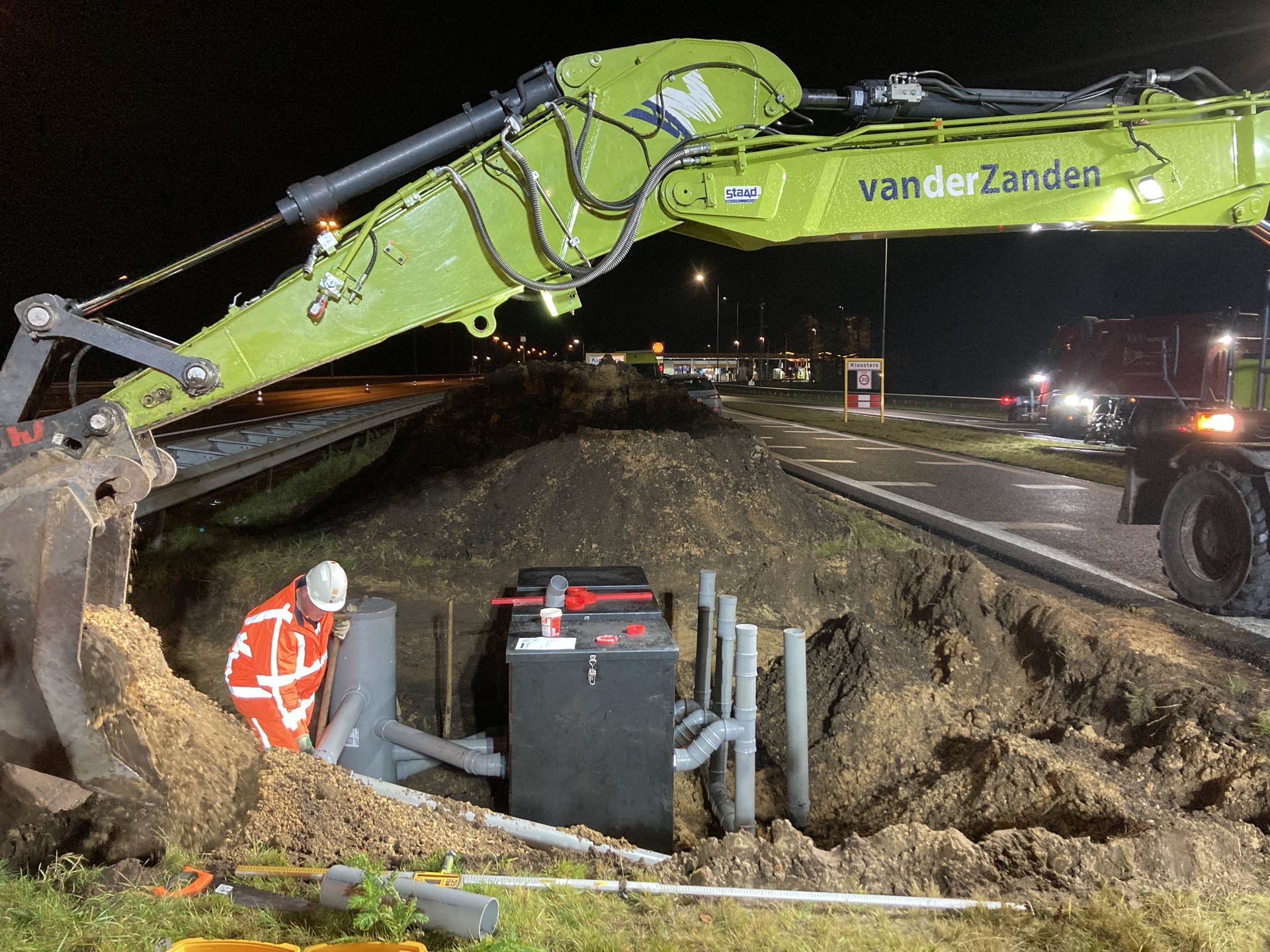Heavy rain showers regularly cause inconvenience on roads. Difficult for road users, but also a waste of run-off water! Could we also use the road to respond to the water demand of the nearby area?
Boris Baetings of Rijkswaterstaat is addressing this question in the European Rural Roadwater Rescue (RRR) project. He explains how European countries are working together on promising applications for highway water. The article is written in Dutch. Below you'll find the translation in English.
Testing ground for innovations
The Kloosters service area is located along the A58 near Oirschot/Eindhoven. Road construction innovations are tested here, such as new asphalt and sustainable noise barriers. Rijkswaterstaat and market parties work together under the name InnovA58. The Rural Roadwater Rescue project has found a place here. Boris Baetings sees opportunities for water storage here. 'Defence, farmers, nature, hockey and football clubs need water. Of course, this must meet requirements, but does not have to be of drinking water quality.' The first step has been taken: Rijkswaterstaat recently measured the quantity and quality of rainwater runoff from the A58.

Multi-year Infrastructure, Spatial Planning and Transport Program
Rijkswaterstaat approaches Rural Roadwater Rescue as a (in Dutch:) MIRT exploration (Multi-year Infrastructure, Spatial Planning and Transport Program), in which alternatives for road water are developed together with those involved and assessed for their effects. Boris explains: 'We want to know how we can collaborate with partners in the vicinity of the road. And we investigate what is and is not possible in practice.' The experiences of international partners are instructive for us. An example of this are basins to purify road water near the highway and the knowledge about reuse of filtered road water.
Use of waste water
At Kloosters, measurements are already being taken of the quantities and quality of run-off water and new research is now being conducted. Boris: 'We want to map out the possible uses of the polluted water. We notice that the step towards drinkable water is a big one. But more applications are conceivable, such as brine, car wash water or water for watering sports fields. The latter offers opportunities for us in the immediate area
International cooperation
The international cooperation in Rural Roadwater Rescue mainly has a learning purpose. How do you limit damage from peak showers? Or how do you store excess water for dry periods? It is also about suitable applications for reuse. Sharing knowledge and experience between European road managers about storage, cleaning and local reuse of water appears to be useful. “Our collaboration to use the road more for social goals strengthens our story within Rijkswaterstaat,” Boris notes.
European regulations are coming
Climate adaptation and the environmental effects of run-off water also play a role in EIA. Boris expects European rules in the long term. 'In the Netherlands there is currently little regulation about polluted run-off water, but that is coming. We can learn from Swiss and French road authorities, who already have experience with filtering, collecting and treating road water.' He also finds the reuse of highway water for purposes close to the road relevant in EIA. “Space is scarce and we see these as positive effects.”
'We do it together' - Boris Baetings
Cooperation in the area
The project organization works in the Netherlands with other governments and users in an equal manner. Boris notices that this form still needs to grow: 'How do you, as a road authority, involve other parties in the area? Not our agenda, but the joint agenda will be leading. This requires us to have an open attitude and also to organize the technical possibilities for this. Of course, provided the safety requirements allow this.'
Road design with new functions
According to Boris, collecting rainwater will eventually become an increasingly important part of road design. It is then less about individual aspects such as the environment, water management or safety. Its added value can then be visualized in EIA through the cumulative effects. 'It is also ideal to identify these opportunities during the exploration phase. Then you also involve representatives of new functions in the road design. We do it together.'
Blended financing
“The trick is mainly to properly organize cooperation between local users,” he notes. This does not have to be without obligation. Because through 'blended financing', others can also bring funds to realize their wishes. As far as he is concerned, the big advantage remains that water from the road is used to solve social problems together. 'It would be great if Rijkswaterstaat can make the connection here.'
Interreg promotes European cooperation in RRR
Interreg Europe is an interregional cooperation program with subsidy options from the EU. The aim of Interreg is to prevent inequality between European regions. The collaboration in Rural Roadwater Rescue (RRR) between Western European countries fits within this subsidy program. Rijkswaterstaat is the lead partner in this. The Interreg program runs until 2027.

The path of the water